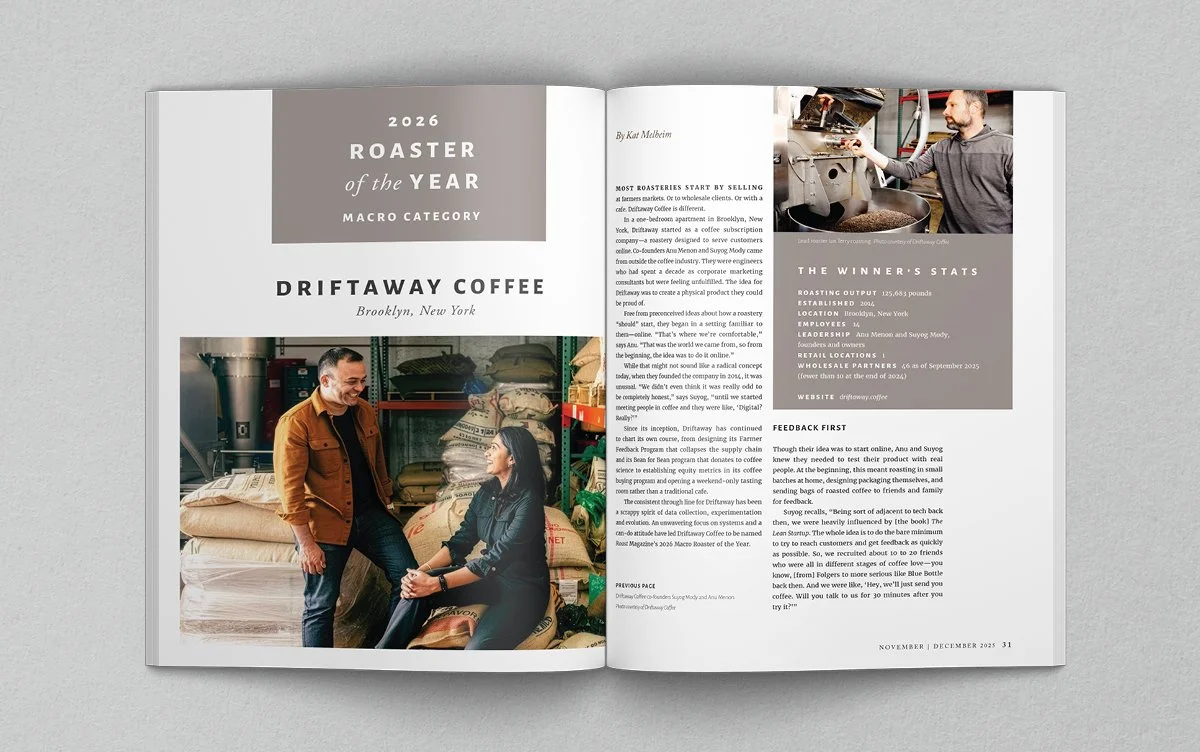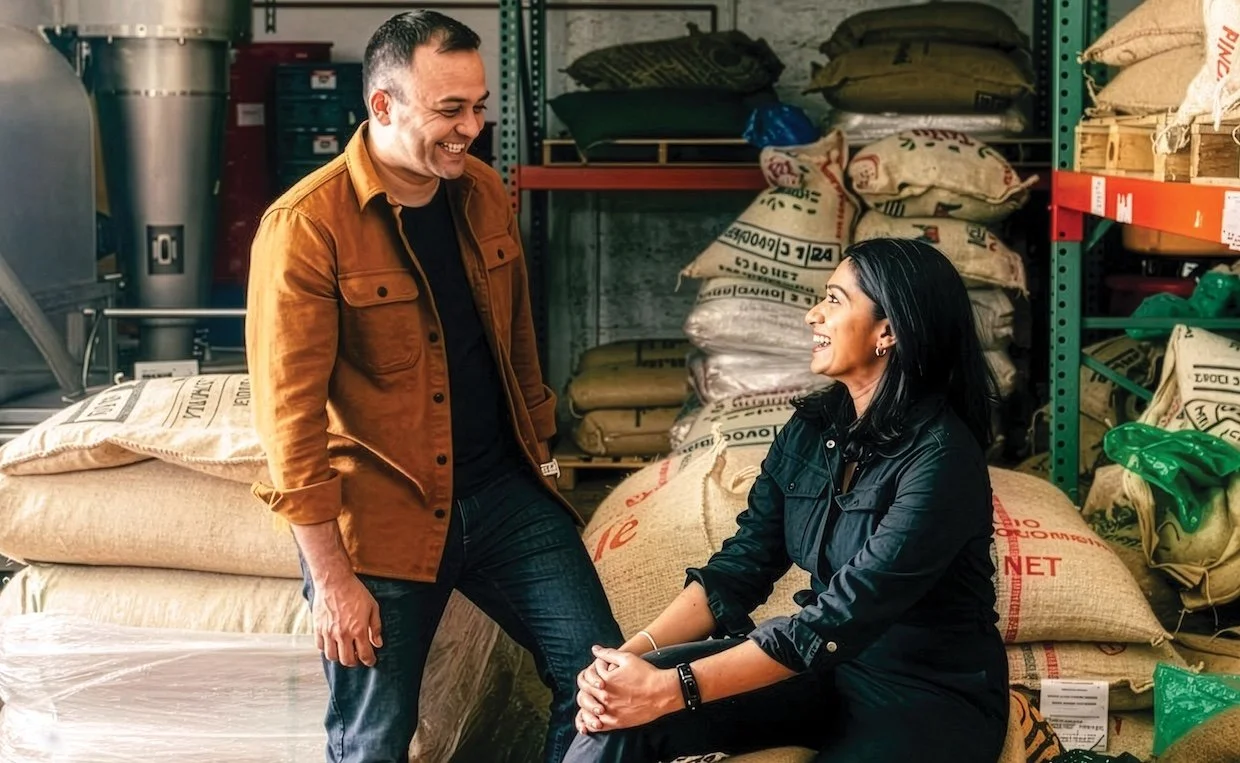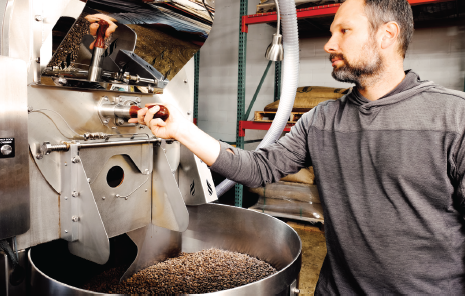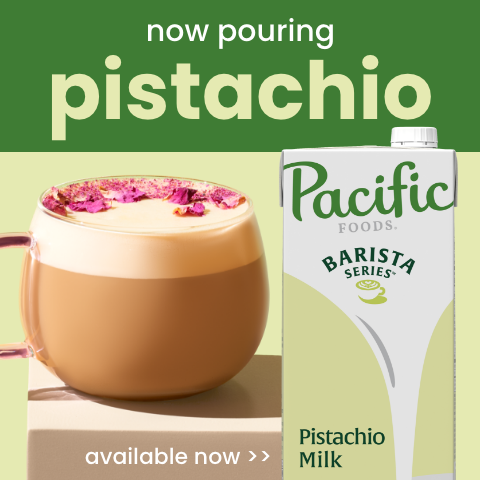Roaster of the Year: Macro Category Winner 2026 — Driftaway Coffee
By Kat Melheim
Most roasters start by selling at farmers markets. Or to wholesale clients. Or with a cafe. Driftaway Coffee is different.
In a one-bedroom apartment in Brooklyn, New York, Driftaway started as a coffee subscription company—a roastery designed to serve customers online. Co-founders Anu Menon and Suyog Mody came from outside the coffee industry. They were engineers who had spent a decade as corporate marketing consultants but were feeling unfulfilled. The idea for Driftaway was to create a physical product they could be proud of.
Free from preconceived ideas about how a roastery “should” start, they began in a setting familiar to them—online. “That’s where we’re comfortable,” says Anu. “That was the world we came from, so from the beginning, the idea was to do it online.”
While that might not sound like a radical concept today, when they founded the company in 2014, it was unusual. “We didn’t even think it was really odd to be completely honest,” says Suyog, “until we started meeting people in coffee and they were like, ‘Digital? Really?’”
Since its inception, Driftaway has continued to chart its own course, from designing its Farmer Feedback Program that collapses the supply chain and its Bean for Bean program that donates to coffee science to establishing equity metrics in its coffee buying program and opening a weekend-only tasting room rather than a traditional cafe.
The consistent through line for Driftaway has been a scrappy spirit of data collection, experimentation and evolution. An unwavering focus on systems and a can-do attitude have led Driftaway Coffee to be named Roast Magazine’s 2026 Macro Roaster of the Year.
Suyog Mody and Anu Menon.
FEEDBACK FIRST
Though their idea was to start online, Anu and Suyog knew they needed to test their product with real people. At the beginning, this meant roasting in small batches at home, designing packaging themselves, and sending bags of roasted coffee to friends and family for feedback.
Suyog recalls, “Being sort of adjacent to tech back then, we were heavily influenced by [the book] The Lean Startup. The whole idea is to do the bare minimum to try to reach customers and get feedback as quickly as possible. So, we recruited about 10 to 20 friends who were all in different stages of coffee love—you know, [from] Folgers to more serious like Blue Bottle back then. And we were like, ‘Hey, we’ll just send you coffee. Will you talk to us for 30 minutes after you try it?’”
Lead roaster Ian Terry.
It wasn’t just about putting coffee in people’s hands; it was about listening carefully to what those people said after they sampled it. That curiosity—and some creative problem solving—led to the creation of the Explorer Box, the tasting kit that is still at the heart of Driftaway’s subscription model. Each kit includes five small bags of coffee, spanning the flavor spectrum from fruity, classic and balanced to bold and extra bold. It invites customers to taste different coffees side by side, compare them, and discover their own preferences in a way most coffee consumers have never experienced.
Genius as it is, the Explorer Box wasn’t dreamed up in a strategy meeting. It emerged organically, and somewhat accidentally. At one point in Driftaway’s early days, Anu and Suyog were running low on a particular coffee, so instead of sending a larger bag of one coffee they shipped a few smaller bags of different coffees. Suyog remembers their friends responding positively, telling them, “This is really cool, because I don’t normally get to try coffee side by side in these smaller portions. I liked this one for this reason and didn’t like that one for that reason.” That moment crystallized an idea that underpins Driftaway’s offerings: Give customers the tools to explore and let them decide what they like.
What started as a scrappy workaround quickly became a defining philosophy for the company: Feedback is the foundation of Driftaway’s business. By putting discovery in the hands of customers and treating every data point as an opportunity to learn, Anu and Suyog built a model that was both approachable and empowering. In an industry where many roasters tell customers what they should like, Driftaway paddled upstream, inviting people to pinpoint their own tastes and using that feedback to shape how the company moved forward.
[Excerpted text — Read the full article at the link below.]
Advertisement













